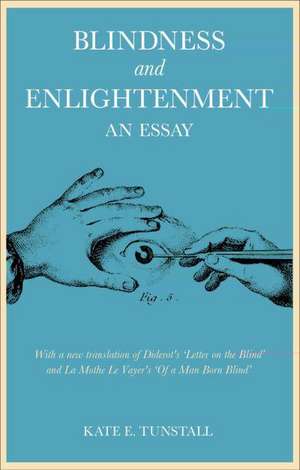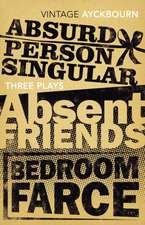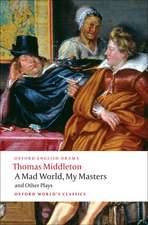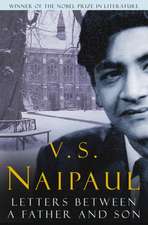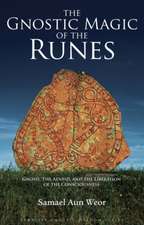Blindness and Enlightenment: An Essay: With a new translation of Diderot's 'Letter on the Blind' and La Mothe Le Vayer's 'Of a Man Born Blind'
Autor Dr Kate E. Tunstallen Limba Engleză Paperback – 19 oct 2011
| Toate formatele și edițiile | Preț | Express |
|---|---|---|
| Paperback (1) | 236.84 lei 6-8 săpt. | |
| Bloomsbury Publishing – 19 oct 2011 | 236.84 lei 6-8 săpt. | |
| Hardback (1) | 772.58 lei 6-8 săpt. | |
| Bloomsbury Publishing – 19 oct 2011 | 772.58 lei 6-8 săpt. |
Preț: 236.84 lei
Preț vechi: 272.31 lei
-13% Nou
Puncte Express: 355
Preț estimativ în valută:
45.32€ • 47.45$ • 37.59£
45.32€ • 47.45$ • 37.59£
Carte tipărită la comandă
Livrare economică 09-23 aprilie
Preluare comenzi: 021 569.72.76
Specificații
ISBN-13: 9781441119322
ISBN-10: 1441119329
Pagini: 256
Ilustrații: 6 illus
Dimensiuni: 138 x 216 x 17 mm
Greutate: 0.32 kg
Ediția:New.
Editura: Bloomsbury Publishing
Colecția Continuum
Locul publicării:New York, United States
ISBN-10: 1441119329
Pagini: 256
Ilustrații: 6 illus
Dimensiuni: 138 x 216 x 17 mm
Greutate: 0.32 kg
Ediția:New.
Editura: Bloomsbury Publishing
Colecția Continuum
Locul publicării:New York, United States
Caracteristici
To introduce Diderot's 'Letter on the Blind' to a wider English-speaking readership, taking it beyond the domain of French Literature and into the disciplines of Intellectual History and Comparative European Literature.
Notă biografică
Kate E. Tunstall is University Lecturer in French at the University of Oxford and Fellow of Worcester College. She is Programme Director of Oxford's Besterman Centre for the Enlightenment, a Director of the Oxford Amnesty Lectures, and she co-authored and co-presented (with Caroline Warman) a series of BBC radio programmes on Diderot.
Cuprins
List of Figures appearing in the EssayAcknowledgements Note on the References Prologue, or Operation EnlightenmentIntroduction: Optics and TacticsOne: Reading is Believing?Two: The Blind Leading the Blind Leading the Blind Leading the Blind Leading the Blind ...Three: Point of View and Point de VueFour: Groping Around in the LightFive: A Supplement to Saunderson's MemoirsSix: Dis/Solving Molyneux's ProblemConclusion, or Two Hours Later ...BibliographyIndexAppendicesI. Denis Diderot, The Letter on the Blind for the Use of Those Who Can See (1749)Note on the TranslationTranslationII. François de La Mothe Le Vayer, 'Of a Man-Born-Blind' (1653)Note on the TranslationTranslation
Recenzii
Diderot's study of cognitive deprivation as a way of understanding cognition itself is one of the most innovative moves in a century of intellectual innovation. Kate Tunstall's brilliant new translation and edition, accompanied by a lucid, witty and incisive essay that initiates the reader admirably into the complex problems raised by the Letter, will be a major resource for anyone wishing to understand core issues in the Enlightenment,
Diderot's Lettre sur les aveugles is one of the strangest and most powerful texts of the Enlightenment, an apparently rambling and jokey discussion of an abstruse philosophical problem, which culminates in a disturbing vision of a godless universe. Kate Tunstall's highly original and beautifully-written analysis is an outstanding treatment of its complexities, ironies, and anomalies, offering a much enriched understanding of the context in which it was produced and of its complex relations with a host of philosophical and literary texts.
Kate Tunstall's precise new translations of Denis Diderot's Lettre sur les aveugles and François de La Mothe Le Vayer's 'D'un aveugle-né' are most welcome resources for the Enlightenment scholar and teacher. Her introductory essay will prove to be even more useful, as it elegantly situates one of the most peculiar yet important of Diderot's early epistemological reflections in the complex of Enlightenment intellectual, theological and medical concepts that furnished its meaning and urgency for Diderot's contemporaries. Under Kate Tunstall's erudite treatment, the allusions, the ironies, the seeming confusion and the politically unsayable resolve into remarkable clarity. Just as importantly, Tunstall's own exposition is elegantly witty and delightfully playful, so we not only comprehend intellectually why this most disconcerting of Diderotian performances was scandalous. In her stylistic evocation of Diderot's voice, Kate Tunstall provides her modern audience with a readerly experience closer to that of Diderot's contemporaries so that we feel as a result something too often lost in this pragmatic age: how much of Diderot's-or any major author's-message depends on a deeply literary culture. A work to be enjoyed on many levels, this book should be on every Enlightenment lover's bookshelf.
Diderot's Lettre sur les aveugles is one of the strangest and most powerful texts of the Enlightenment, an apparently rambling and jokey discussion of an abstruse philosophical problem, which culminates in a disturbing vision of a godless universe. Kate Tunstall's highly original and beautifully-written analysis is an outstanding treatment of its complexities, ironies, and anomalies, offering a much enriched understanding of the context in which it was produced and of its complex relations with a host of philosophical and literary texts.
Kate Tunstall's precise new translations of Denis Diderot's Lettre sur les aveugles and François de La Mothe Le Vayer's 'D'un aveugle-né' are most welcome resources for the Enlightenment scholar and teacher. Her introductory essay will prove to be even more useful, as it elegantly situates one of the most peculiar yet important of Diderot's early epistemological reflections in the complex of Enlightenment intellectual, theological and medical concepts that furnished its meaning and urgency for Diderot's contemporaries. Under Kate Tunstall's erudite treatment, the allusions, the ironies, the seeming confusion and the politically unsayable resolve into remarkable clarity. Just as importantly, Tunstall's own exposition is elegantly witty and delightfully playful, so we not only comprehend intellectually why this most disconcerting of Diderotian performances was scandalous. In her stylistic evocation of Diderot's voice, Kate Tunstall provides her modern audience with a readerly experience closer to that of Diderot's contemporaries so that we feel as a result something too often lost in this pragmatic age: how much of Diderot's-or any major author's-message depends on a deeply literary culture. A work to be enjoyed on many levels, this book should be on every Enlightenment lover's bookshelf.
